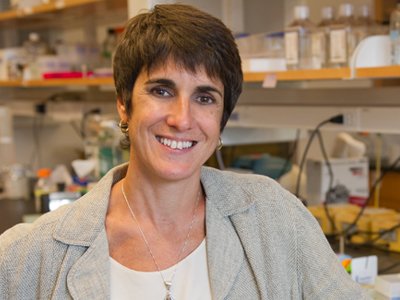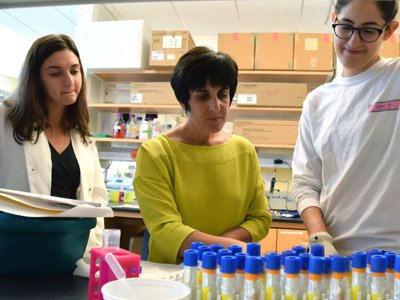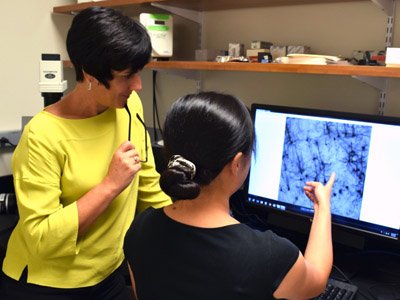Sandra Hewett: 'Science Is Hard Work, but It’s Fun'
Director of Interdisciplinary Neuroscience Studies mentors scientists from undergrad to professional

As an undergraduate, Sandra Hewett expected to become a medical doctor. But her career goal changed when she stepped into a research laboratory. “I was instantly enthralled by the interactive nature of science, the ability to ask and answer one’s own challenging questions,” she says. “You’re continuously learning new things. I realized I was better suited for research.”
Hewett, the inaugural Beverly Petterson Bishop Professor of Neuroscience and director of Interdisciplinary Neuroscience Studies in the College of Arts and Sciences since 2011, strives to share with her colleagues, undergraduates and graduate students the excitement she experiences while doing scientific research. Her efforts are paying off: The number of undergraduates majoring in neuroscience has increased from 20 in 2010 (the year the program was established) to nearly 150 today. The graduate concentration in neuroscience was approved in 2014-2015, and 10 students are currently enrolled.
“I love exposing students to something new and something they didn’t expect,” she says. “They often have a misconception about scientific research and researchers. Research is inherently creative, and not all researchers are introverts.” The scientists in Hewett’s lab “are very inquisitive, very bright and highly interactive” she says. “I want to showcase the camaraderie in the lab.”

Hewett, and the researchers she mentors, find science hard work, but they also consider the field intellectually stimulating and fun. She tells a story about a graduate student who could not wait to get to the lab one morning to perform a study. “I love that,” Hewett says. “I like to see that passion. Yes, we have hypotheses and expected results. But overall, there’s an excitement: ‘I wonder what will happen?’ The idea you can pursue a line of investigation that you think the world needs to know is the coolest thing about my job. I want students to think it’s cool, too.”
Hewett, whose research has been funded continuously from the National Institutes for Health (NIH) since 1997, currently holds two awards to study the molecular and biochemical processes that occur in the brain after injury. She is particularly interested in the function and dysfunction of astrocytes, star-shaped cells that provide physical and nutritional support for neurons.
Apart from her own work, she recently spearheaded an effort to grow spinal cord injury research at the University, receiving funds from the New York State Department of Health in support. Participating Interdisciplinary Neuroscience Program faculty include Julie Hasenwinkel, professor of biomedical and chemical engineering with appointments in the Department of Biomedical and Chemical Engineering and the Syracuse Biomaterials Institute; and Katharine Lewis and Jacob Shreckengost, both professors in the Department of Biology.
Hewett also takes very seriously the need to teach her trainees to write grants and win funding in support of their own research. “I’m trying to make sure that I train them and provide the correct experiences that will set them on the pathway to success, and this includes the ability to attain independent funding to support their projects,” she explains.

Toward this end, Yan He, her post-doctoral trainee, recently received a prestigious American Heart Association grant. The award is designed to provide fellows, who are not yet independent, with assistance and training from a mentor to facilitate a career in cardiovascular and stroke research. Sheila Shahidzadeh, a biology/neuroscience graduate student in the Hewett lab, recently submitted an application to the NIH for pre-doctoral support and is on her way to Alpbach, Austria, after being selected by a competitive process to attend the International Society for Neurochemistry’s Flagship School conference on “The Malleable Brain.” Finally, Hewett received a diversity in health-related research supplement from the NIH to support the summer and academic year research project of biology/neuroscience major Saydee McQuay ’17, who is also a member of Syracuse’s rowing team. The grant is Hewett’s third diversity supplement in five years.
Reflecting her interdisciplinary focus and a commitment to scientists at all stages of their careers, Hewett says, “I just want to help people get to where they want to be.”
Featured
Sandra Hewett Beverly Petterson Bishop Professor Emerita of Neuroscience and Professor of Biology
